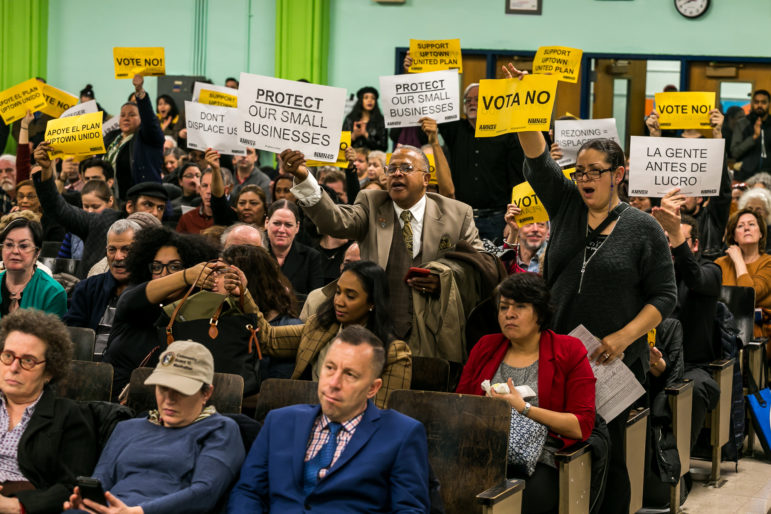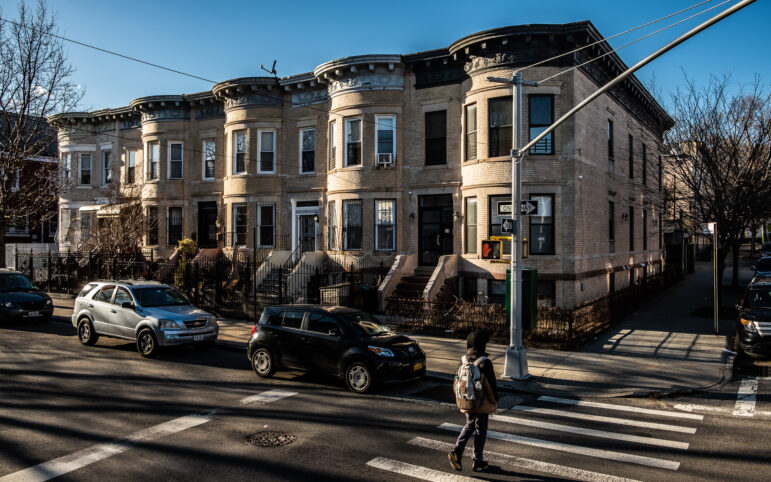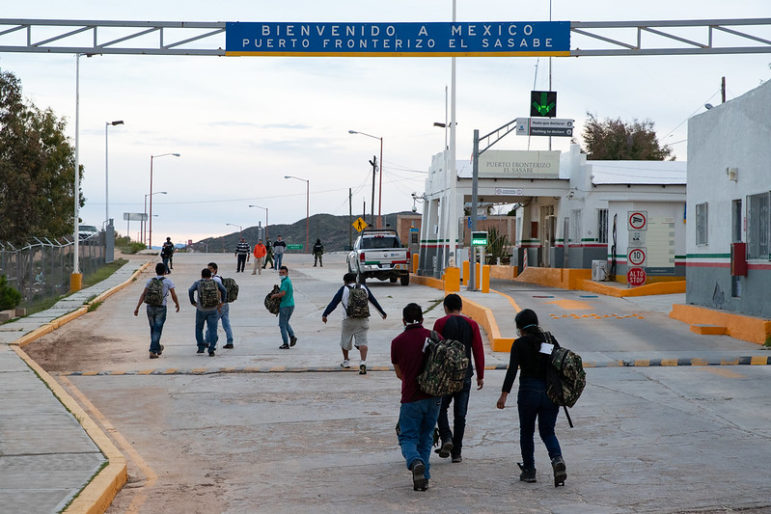The cheers were bleeding onto the pavement in front of the South Bronx Regular Democratic Club on primary night, but they were only for Tino Martinez.
Inside the club, under the faded U.S. and Puerto Rican flags, a few old men slurped their Maltas and watched Martinez and the Yankees on a small color TV. The political sachems who had spent their day working out of the club avoided the inside like a suicide scene. It was 9:30 and they’d been beaten up, so they slackened their ties, muttered their morose jokes and worried their Marlboros down to the butt. Everyone except Paul Mejias.
Mejias, a former city elections commissioner and the most seasoned of street operatives, was inside peeling poll results from manila envelopes. With each bit of predictable bad news, his huge mustache seemed to droop at a more pronounced angle, like an upside-down horseshoe with all the luck running out of it.
When Mejias had seen enough, he lumbered out to the sidewalk to summon the South Bronx regulars into the clubhouse for the concession speech of soon-to-be ex-Councilman Federico Perez.
The candidate, appropriately enough, was nowhere to be found.
When the evening was over, the results were as follows: Pedro G. Espada, 5,168; Federico Perez, 3,445; Luis DeJesus, 2,243. Perez, a clubhouse old-timer who ran a low-octane campaign, was the only incumbent in the City Council to be kicked Out of office during this year’s primary season.
The landslide victory of 23-year-old Pedro Gautier Espada, the scion of a nonprofit empire founded by his politically ambitious father, was a footnote in the dailies–but it sent a seismic shock through South Bronx politics.
For starters, it puts the Espada political clan back into power after being routed by the county Democratic organization last year.
Second, it points up the fact that Ramon Velez–who happens to be Rudolph Giuliani’s highest profile Bronx supporter and the man for whom Ed Koch coined the term “poverty pimp”–allowed his close friend Perez to be trounced, encouraging political chaos an turf Velez once controlled with an iron fist. It could be an indication of just how well Giuliani’s divide-and-conquer policy is working on Democrats in poor neighborhoods.
But most importantly, the race obliterates the hyped-up fiction that Bronx Democratic boss Roberto Ramirez had succeeded in fulfilling his promise to re-establish a unified county political machine.
“This whole Bronx unity thing was something which was held up to the world and now everybody knows it was bullshit,” says a source in the Perez campaign. “There is no Bronx unity, it’s just every man for himself, as usual.”
The beneficiaries of the renewed chaos are the Espadas, who have forged a Little Machine that Could. On September 9, it whipped the Big Machine that Wouldn’t, wielding the same bag of tricks that slum power brokers have used for years. The Espada campaign was staffed almost exclusively by employees of his father’s financially-troubled health care empire–and bankrolled almost entirely by its staff, including clerks, receptionists and maintenance workers. With that cash, Espada was able to pay his “volunteers” an astounding $100 to hand out palm cards.
In the South Bronx, where almost every politician uses a non-profit community-based organization as a base of political operations, the Espadas have created the most tightly-knit and efficient political operation seen in years. It is this strength, coupled with the county machine’s failure to recognize it, that has put the Espadas back on the political map.
Now they are planning their assault in the state elections next year, in all likelihood running candidates against Ramirez allies state Senator David Rosado and Assemblyman Ruben Diaz, Jr. At the beginning of this year, Ramirez had hoped to rule the city. Next year he’ll sweat just to keep his hold on the South Bronx.
_______
What makes the defeat so bitter for the regulars is that 1997 was supposed to be the Year of the Bronx.
In 1994, Roberto Ramirez, a close ally of Bronx Borough President Fernando Ferrer, was elected to the party leadership. On a pledge to unify a county Democratic machine shattered when powerful county leader Stanley Friedman was convicted of corruption a decade ago. To signal his intentions, he hung a banner in the county’s headquarters that read: “The Bronx Is United.” His motivation was part ego, part necessity. A tight county machine can command a bigger chunk of state and city discretionary budgets and steer more contracts to neighborhood groups. It can also keep infighting among the locals to a minimum, conserving precious political resources and staving off pesky insurgent candidates.
In keeping with that philosophy, Ramirez attempted to quell internecine fights, including his own long-running feud with Congressman Jose Serrano, whom he beat to take the county leadership. As a legislator, he lined up most of the borough’s state reps to support a landlord-backed bill requiring mandatory rent deposits in Housing Court, a move that angered tenant groups but secured real estate money for party campaigns.
All of this was in preparation for his grandest objective: getting Freddy Ferrer to run for mayor.
Ramirez culled support for Ferrer by invoking the unifying principle of self-interest. Whether Ferrer won or lost, he argued, his run would open up the top of the borough’s political ladder, allowing almost every official to move up at least one rung. The whole crew would gain increased access to borough hail patronage slots. And if Ferrer actually won City Hall, the Bronx machine would plumb an incredibly rich mine of jobs and contracts. It was strictly win-win.
Ironically, he faced his toughest task lining up support in his home turf of the South Bronx, arguably the most fractious 10 square miles in New York City politics. “At one time or the other, everybody has been everybody else’s brother and everyone else’s enemy,” says City Councilman Israel Ruiz, a longtime Ramirez foe who unsuccessfully opposed Ferrer for borough president in this year’s primary. “Every time you see a political fight up here, you have to keep in mind that there’s usually an economic reason behind it. Politics and business are indistinguishable and that’s what accounts for all the fights.”
Ramirez has exhibited a profound understanding of the money-politics nexus, linking Bronx legislators to new donors who have pitched in $2 million for his candidates. Through a combination of finesse and arm-twisting, (“A lot of this has been done with Krazy Glue,” he conceded to the New York Times earlier this year) he lined up almost every leader in the borough behind Ferrer–with the notable exception of Ramon Velez, who cut an endorsement deal with Giuliani.
On the basis of this performance, Ramirez has been touted as the architect behind what might be the first great minority-run county political machine in city history. But citywide perceptions are always tempered by Bronx reality.
“When you’re in an empty room and someone whispers, it sounds like a cannon shot,” explains political consultant Norman Adler. “The Bronx was an empty room and Roberto whispered.”
_______
The fight with the Espadas is the only battle the leader has chosen to answer with force rather than talk.
The whole feud began with a double-cross. In early 1996, Hector Diaz was vacating his assembly seat to become county clerk. For reasons that are not entirely clear, then-state Senator Pedro Espada, Jr. (despite his name, he’s Pedro G.’s father) agreed to retire–but only if the party agreed to back his son for Diaz’s assembly seat. Espada shook hands on the deal but when the time came for him to quit, he announced his intention to run again for state senator. At first, the ploy seemed to work. Young Pedro G. was elected in the special election to fill the Diaz assembly seat.
But during the regular election last September, Ramirez flexed his vengeful muscle, running City Councilman David Rosado against Pedro, Jr. for the senate seat, and newcomer Ruben Diaz, Jr. against Pedro U. for the assembly. The county machine’s election law apparatus was deployed and both Espadas were thrown off the ballot for collecting bad petitions. Ramirez’s candidates won. Earlier this year, when Pedro G. prepared to run against Federico Perez for Rosado’s vacant City Council seat, Ramirez again brought down the full weight of his lawyers and knocked him off the ballot.
At around the same time, press accounts reported that the U.S. Attorney’s Office and the city Department of Investigation were looking into questionable Medicaid billing practices at the elder Espada’s health center. The clan’s political future looked bleak.
That is, until Ferrer bowed out of the mayor’s race and shattered Ramirez’s best-laid plans.
“When Freddy decided to back out, l think it took a lot of steam out of them and they stopped working,” said Pedro G. a few days before the election, sitting in the cramped offices of the organization he runs, Neighborhood Empowerment Center (NEC), on 149th St. “I think that is what has given us this chance.”
_______
At 10 am. on September 9–already five hours into his primary day routine–Pedro the Younger emerged from a Melrose public school, flanked by a skinny fellow in a suit and a mountain-like man with a camcorder slung around his sequoia neck. “I got my lawyer. I got my muscle. I got my video camera, just in case they try anything stupid.”
Espada is a squat, bounding, dimpled 220-pounder with the energy of a man utterly certain about his life’s trajectory and his father’s willingness to support him. His hands are always moving: jamming a renegade shirttail back into his slacks, patting his hair back, pumping handshakes. His aw-shucks enthusiasm seems misplaced in the 1990s South Bronx. “We’re going to run a hell of race!” he said before darting off.
Early on Primary Day, it became apparent that Espada’s people were getting out the vote a lot more successfully than his opponents. The Espada volunteers wore bright red 1-shirts and blustered like cheerleaders. At P.S. 65, in the heart of Velez territory, 34-year-old Nancy Santiago exhorted voters with shouts of “Vote Espada!” and crammed the candidate’s palmcard into every passing hand. The nearby Perez table was occupied by two huddled seniors who looked like they were trying to keep from catching cold, even though the weather was in the mid-70s.
Still, Santiago’s pep was the product of something a little more potent than mere democratic fervor. “I like Espada and I think I would have come out here for a few hours,” she said. “But not for the whole day, not without getting my $100…. Do you think I’ll get my money?”
Espada admits to paying “a lot” of people the day-rate, but says it’s only fair considering the amount of work they put in. “These are people who worked for me from 5 in the morning to late at night. We paid them sub-minimum wage.”
On the opposite corner was another shouting Santiago with even greater motivation. Mike Santiago (no relation to Nancy) was a personable, extremely articulate Espada volunteer with a potential job attached to the end of his election day toil. A former member of the elder Espada’s senate staff, he was looking forward to employment in Pedro G.’s council office.
For two weeks prior to the election, Santiago, a Vietnam vet and American Legion member, canvassed the hallways of the nearby Diego Beekman Houses, where he used to head up the security detail. “I still have a lot of friends here,” he said–and on cue two of them, a twentyish couple, appeared. He shot over, hugging the man and asking him if they had voted for Espada. “Yeah, man, don’t worry, we just did.”
The Santiago double-team paid off. The poll site, located in Mott Haven, was considered solid for Rosado and Perez, but it broke for Espada two-to-one. Perez generally won the areas of the district where Velez has the most influence, including Melrose and southern Morrisania. But both Espada and ACORN-backed insurgent Luis Deiesus made unexpected inroads there. Espada, in turn, brought out large numbers of voters in the eastern part of the district, especially in Hunts Point and Soundview, where Perez showed poorly.
The Soundview connection was especially important because Espada’s father employs 400 people at the Soundview Health Center on the edge of the neighborhood. At P.S. 93, the Espadas’ most reliable polling place, Sandra Love, a vice president of the health center, dispensed fried chicken legs and cups of Coke to anyone who wanted some–even her opponents’ canvassers.
“I know this neighborhood. This is where I lived for many years,” she said, neglecting to mention that she had been kicked off the local school board for failing to disclose her true residence in Mt. Vernon, just over the Westchester border. Her house is only a few miles away from the split-level owned by her boss Pedro, Jr., who maintains a “part-time” residence in suburban Mamaroneck.
Love and many other Espada employees also filled the campaign’s coffers. A City Limits analysis of Espada’s contribution records showed that at least $23,000 of the $39,000 in reported contributions came from employees–or relatives of employees–who work in one of the Espada family’s nonprofits.
Executives gave between $700 and $1,000. But even lower-level employees made considerable contributions. Brenda Alverio, a Soundview receptionist, forked over $700; a clerk named Lydia Rivera gave $500, and Pedro G.’s secretary at the Neighborhood Empowerment Center contributed $700.
The candidate bristled at any notion that using employees in such a way was improper. “No one’s forcing them to do this,” Espada said. “I love these people. These are people that are very close to my family. Of course they would support me.”
That may be so, but the Espadas have blurred the already thin line between running a service organization and a permanent campaign office. NEC, run by Pedro U., is supposed to be a neighborhood nonprofit, but the place looks every bit like a campaign office, with stacks of campaign literature everywhere and a box of Espada-for-Council hair combs. The sign above the door has the organization’s name on it, but the words “Pedro G. Espada, Executive Director” are at least twice as big. The front door is still emblazoned with seal of the New York State Senate, a relic from the days when his father served in Albany and compiled one of the worst attendance records of any legislator.
And if Espada employees’ money flows freely into the cam-paign, it doesn’t seem to find its way so readily to the state Department of Taxation and Finance.
City Limits has learned that last October the state assessed alien on the Soundview Health Center, citing $413,000 in back payroll taxes that were supposed to have been deducted from employees’ checks each week. Since then, Pedro, Jr. has paid back about $43,000 of the debt.
“The bottom line is that we had a former fiscal person who had not been paying payroll taxes,” explained the elder Espada. He says he is suing the staffer, whom he refused to name. “We have a plan to pay the balance.. ..But to me, at this point, that’s water under the bridge.”
_______
Ramon Velez created the model for the Espadas’ profitable non-profit political operation. Velez, who possesses a Rottweiler temper and a wrecking-bail belly, has for 30 years run an empire of housing and social service operations based out of the Hunts Point Multi-Service Center. The center grosses $22 million a year, almost 99 percent of it from government grants and reimbursements. Twenty of the employees make more than $50,000 a year. He pays his comptroller $160,000 and his accountant $110,000.
According to press accounts, Velez has personally profited from his charitable work by establishing for-profit companies–Ravel Associates, Ltd., a real estate firm, among them–to work hand-in-glove with his nonprofits on various development projects.
Officially, he pays himself no salary for running Hunts Point Multi-Service; he does, however, collect $219,600 a year in “deferred compensation.” His son Ramon, Jr. pulls down $77,200 a year as director of the South Bronx Community Development Corp., which runs senior citizen and low-income housing.
For years, Velez has used the organization as a private campaign army–a tactic that has been emulated by virtually every other elected official in the borough. He doesn’t need to coerce employees and tenants to vote for the candidates he backs. They do so because he provides jobs in a neighborhood where they’re scarce and creates safe shelter in communities that have little. “He’s not as active as he used to be, but he still probably controls a total of maybe 3,000 voters,” says a former Hunts Point Multi-Service employee. “In a neighborhood where you get like 7,000 people coming out for an election, that’s a substantial amount. Plus he’s got the client lists of all his health care facilities, He’s got senior centers. And he mobilizes all the tenants in the buildings he runs.”
Velez served as a councilman in the 1970s, but he has concentrated most of his efforts in the last 25 years on getting his friends–most of them members of the South Bronx Regular Democrats–elected. Federico Perez is a Velez pal. Hector Diaz, the longtime assemblyman and current county clerk, is a Velez protégé, as is former Councilman Raphael Casteneira-Colon, who was kicked out of office after being convicted of pocketing money that was meant for his staff’s paychecks.
At the moment, his most powerful political progeny is David Rosado, a former Hunts Point Multi-Service employee who has used Velez’s base as a springboard for election to the Assembly, the City Council and, most recently, the State Senate. Rosado, who is District Leader in the 74th Assembly District, helped run Perez’s campaign.
Despite his friendship with and support of Democrats, Velez himself is a Republican and an ardent Giuliani supporter. That doesn’t seem so crazy when you realize that Velez and his son have received about $30 million in city housing, health, children’s services and substance abuse treatment contracts since 1990. Directly across the street from a senior center he runs, his supporters have hung a big “Democrats for Giuliani” banner.
Many of the South Bronx regulars are also Democrats for Giuliani. The day after his loss, Perez announced his support for the Mayor–along with his intention to oppose Espada on the Liberal Party line.
Still, for reasons that aren’t entirely clear, Velez, who was busily planning a 30th birthday party for Hunts Point Multi-Service, was nowhere to be found on election day.
When Perez’s workers ran short of campaign lit and street money, they appealed to their second political master, Ramirez, who was reportedly stunned by the condition of a campaign he had largely taken for granted. He was furious at Velez for not saving Perez.
Sources say the machine’s defeat can be chalked up to Ramirez’s aloofness and his full-time support of Adolfo Carrion, who easily won the empty council seat formerly occupied by borough president candidate Israel Ruiz. The county organization provided some volunteers and a few union contacts to Perez, but that was it. “We thought Ramon and Rosado were handling everything,” said a source close to Ramirez.
In turn, Perez supporters point fingers at the county. “We had like $15 in the bank a few days ago,” Rosado said on Primary Day. “If I hadn’t lined up a few quick donors, we wouldn’t even have a Street operation.” In all, the Perez campaign only fetched about $ 13,000–half of that cadged from last-minute donations from the Ferrer campaign, The Bronx County Democratic Trustees ($1,000), the sheet metal workers union ($3,550) and $300 from
Rosado’s own campaign fund. Velez wrote a $1,000 check in March, but nothing afterwards. Rosado, like Espada himself, chalked up the loss to the county organization’s languor in the wake of Ferrer’s decision not to seek the big prize. “If Freddy had run, everything would have been completely different,” added Rosado, exhausting his palmcards. “The place would have been really jumping. I’m telling you, the dogs would have been out here barking.”
_______
For the moment, the only baying hounds are the Espadas. And they’ve got their eyes on Rosado’s senate seat and Ramirez’s reputation. Sources close to Ramirez say the leader has pledged to devote considerable resources next year to keep Rosado and Assemblyman Ruben Diaz in office. Rosado has already begun mapping a counterattack.
But whatever happens, Ramirez has lost much of his kingmaker lustre and the party organization, bereft of Ferrer’s unifying candidacy, is looking like a shorn Samson.
As if Ramirez needed any more proof that losing Ferrer at the top of the ticket could be his undoing, he was given the following instructional lesson on Primary Day:
The county organization gave the Perez troops palmcards with second-choice Ruth Messinger’s picture at the top–even though the Manhattan borough president did not campaign in the district and had virtually no support among club regulars. At Perez’s instruction, volunteers at the club spent hours ripping Messinger’s likeness off the top of the ticket.
Ferrer’s image, on the other hand, remains a potent tool. On Primary Day, Espada’s $100 wonders passed out cards with the borough president at the top–even though Ferrer had endorsed the machine candidate, Perez.
A grinning Espada explained the trick: the card trumpeted his own endorsement of the popular Ferrer, not vice-versa. By mid-afternoon, the Ramirez-Ferrer camp realized what was going on and filed for an injunction on Espada’s use of the palmcards. A state judge okayed it a few hours later.
By 6 P.M., 12 hours into election day, the cops hauled away the few remaining Freddy cards that the Espadas hadn’t already doled out.








